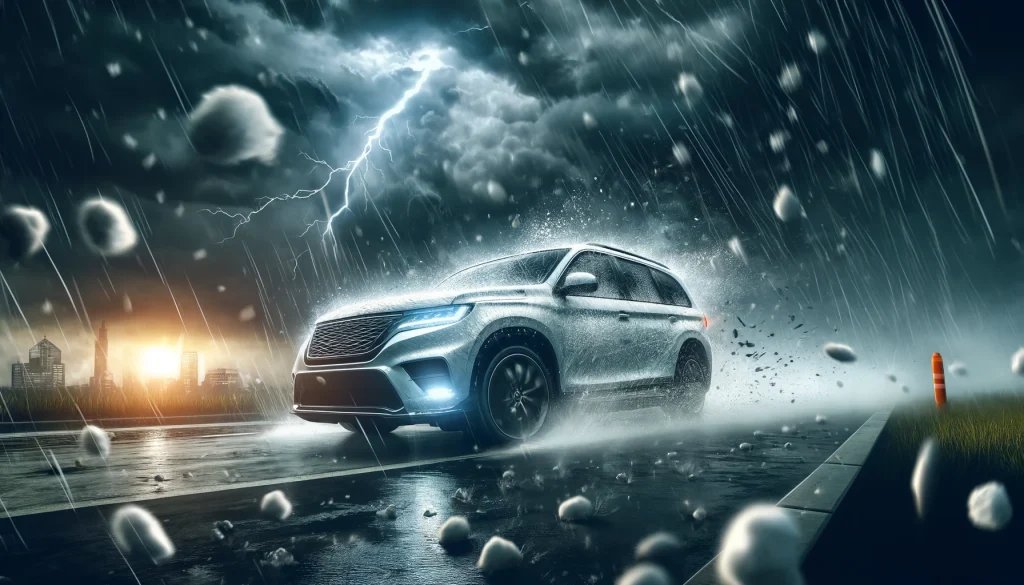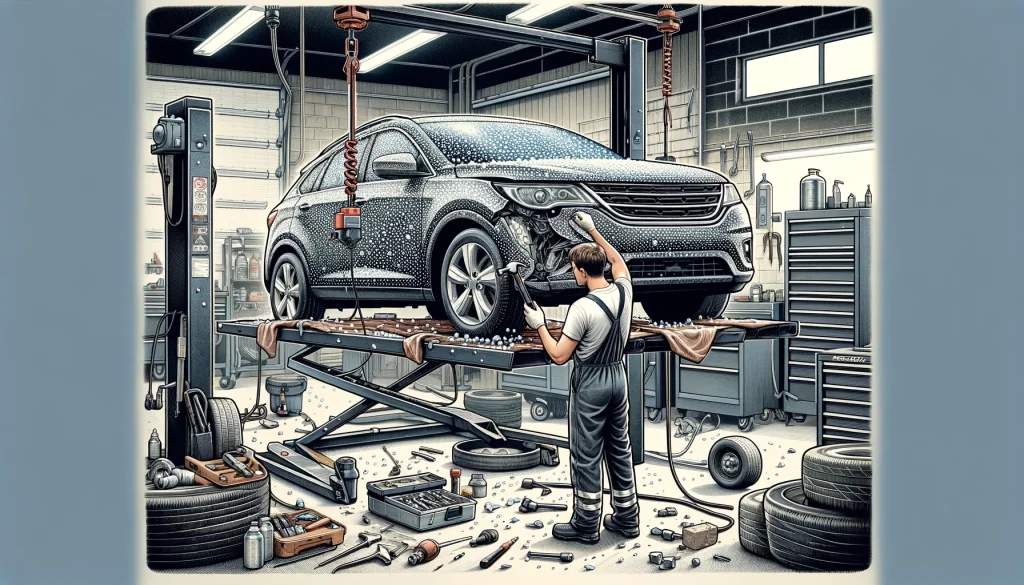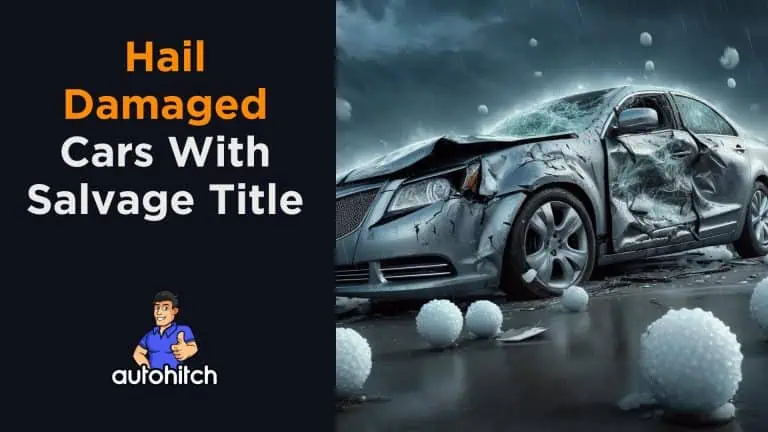Hail damage can be a major issue in certain areas of the country, big enough that severe hail damage could lead to a car receiving a salvage title.
A salvage title indicates that an insurance company has declared the car a total loss due to the cost of repairs exceeding a certain percentage of its value, typically 70-80%.
With the cost of cars these days, it’s no wonder that exterior damage can result in a car being totaled even when nothing mechanically is wrong with the vehicle.
Below I will discuss what it means to have hail damage on a car’s title, insurability, financing, value, and whether it’s worth repairing or keeping a hail-totaled vehicle.
Table of Contents
How much hail damage to total a car?

A car is likely totaled by hail damage if the cost of repairs is between 60% and 100% of the car’s ACV, depending on the state’s rules.
The decision to tal a car also depends on the car’s age, the severity of damage, and the insurance company’s assessment.
Here is a breakdown:
- Percentage of Actual Cash Value (ACV): Cars are usually considered totaled if the repair costs exceed a certain percentage of their ACV. This threshold varies by state, for example:
- Texas: 100% of ACV.
- New York: 75% of ACV.
- Other States: Use a Total Loss Formula (TLF) where repair costs plus salvage value are compared to the vehicle’s ACV.
- Age and Value of the Car: Older or less valuable cars are more likely to be totaled. For example, $4,000 in repairs on a car worth $5,000 may lead to a total loss if it meets the state’s threshold (like 75%).
- Extent of Hail Damage: The nature of the damage affects this decision. Severe damage, especially to critical areas like the structural integrity or safety features, often results in the car being totaled.
- Insurance Company’s Decision: Ultimately, the insurer’s evaluation based on state laws and the specifics of the damage will determine if a car is totaled.
Does hail damage result in a salvage title?
Yes, severe hail damage can and often does result in a salvage title if the cost to repair the dents, broken glass, and other issues exceeds the threshold set by the insurance company and state laws.
However:
Some states have a specific “hail” designation on salvage titles to differentiate them from titles branded due to accidents or flooding.
This means that even if the insurance company totals a car from hail damage, the title could remain “Clean” but with a “Salvage designation”. At the end of the article I have listed the states that allow titles to remain clean even after being totaled from hail damage.
Potentially Helpful Related Articles:
- Is It Illegal To Trade in a Car With Problems
- Is It Illegal To Sell A Car Without Disclosing Problems
- How to Turn a Salvage Title into a Rebuilt Title
Can you insure or finance a hail damaged car with a salvage title?

Insurance
Insuring a hail damaged car with a salvage title can be a bit more challenging than normal if your car is given a salvage title.
In this case, most insurance companies will only provide liability coverage because the actual value is difficult to determine. Comprehensive and collision coverage will also be hard to obtain.
However, if your state allows you to keep a clean title, most insurance companies are likely to offer you standard coverage, including liability, collision, and comprehensive.
The premiums may be higher than before due to the vehicle’s damage history, but you likely won’t face the same restrictions as trying to insure a rebuilt salvage car
Financing
Similarly, banks are unlikely to issue a loan for a salvage vehicle due to the uncertainty surrounding its actual market value.
Related Articles To Read:
How much does a salvage title affect a car’s value?
A salvage title significantly reduces a car’s resale value, even after repairs. Vehicles with salvage titles are usually worth 20-50% less than comparable cars with clean titles.
I will say though that a car with a salvage title from hail damage is probably easier to sell than a car that was involved in a major accident or a flood.
Is it worth fixing hail damage on a car

Whether a car is worth fixing or keeping after hail damage varies on several factors:
- How severe was the damage?
- Was the car totaled by your insurance company?
- Will the insurance check cover the cost of repairs?
- Does your state allow you to keep a clean title?
For example: If I had a car that was totaled by my insurance company, and the check covered the repairs, I would absolutely get the car fixed and continue to drive it. That’s because Florida (where I live) would allow the title of the vehicle to remain clean, but with a hail damage designation, which does lower its value, just not as significantly as a salvage/rebuilt title.
The bottom line is that if you own the car outright, you decide whether to keep the insurance payout and live with the damage or repair the vehicle.
However, if you still have a loan, the lender will probably require you to fix the car to protect their asset. Keep in mind that pre-existing hail damage will be deducted from future insurance claims.
What are the cons of buying a car with a salvage title from hail damage?

I’ll be honest with you here: As a former dealer and car enthusiast, I wouldn’t at all mind buying a car that suffered major hail damage.
My reasoning for that is that you have only really experienced exterior damage. Mechanically and electrically, the vehicle is perfectly fine.
That being said, the main risks I see of purchasing a hail-damaged car with a salvage title include:
- Potential safety issues due to the severity of the original damage and quality of repairs
- Difficulty insuring the vehicle, especially with comprehensive and collision coverage
- Challenges in obtaining financing
- Significantly reduced resale value
States With Hail Damage Designation on Car Titles
| State | Specific Hail Damage Title Brand | General Practice or Note |
|---|---|---|
| Arizona | Yes | |
| Florida | Yes | |
| Idaho | Yes | |
| Kansas | Yes | |
| Kentucky | Yes | |
| Louisiana | Yes | |
| Maryland | Yes | |
| Mississippi | Yes | |
| Missouri | Yes | |
| Montana | Yes | |
| Nebraska | Yes | |
| New Mexico | Yes | |
| North Dakota | Yes | |
| Oklahoma | Yes | |
| South Dakota | Yes | |
| Texas | No | Typically marked as “salvage” if hail damage repairs exceed a certain percentage of vehicle value. |
| Utah | Yes | |
| Virginia | Yes | |
| West Virginia | Yes | |
| Wyoming | Yes | |
| Vermont | Yes | Specific designation as “03 Hail Damage” which means the vehicle was damaged by hail. |
| Other States | No (general practice mentioned) | Some states might not have a specific hail damage title brand and use a “salvage” designation for hail-totaled vehicles instead. |
My Final Thoughts
Cars with extreme hail damage, especially newer cars, are more likely to end up with a salvage title.
While I personally believe hail damaged cars are a bargain (even with a salvage or rebuilt title), there are significant downsides to consider:
These vehicles can be harder to insure, finance, and resell, and may have hidden damage or subpar repairs. Potential buyers should carefully weigh all these factors before making a purchase decision.



